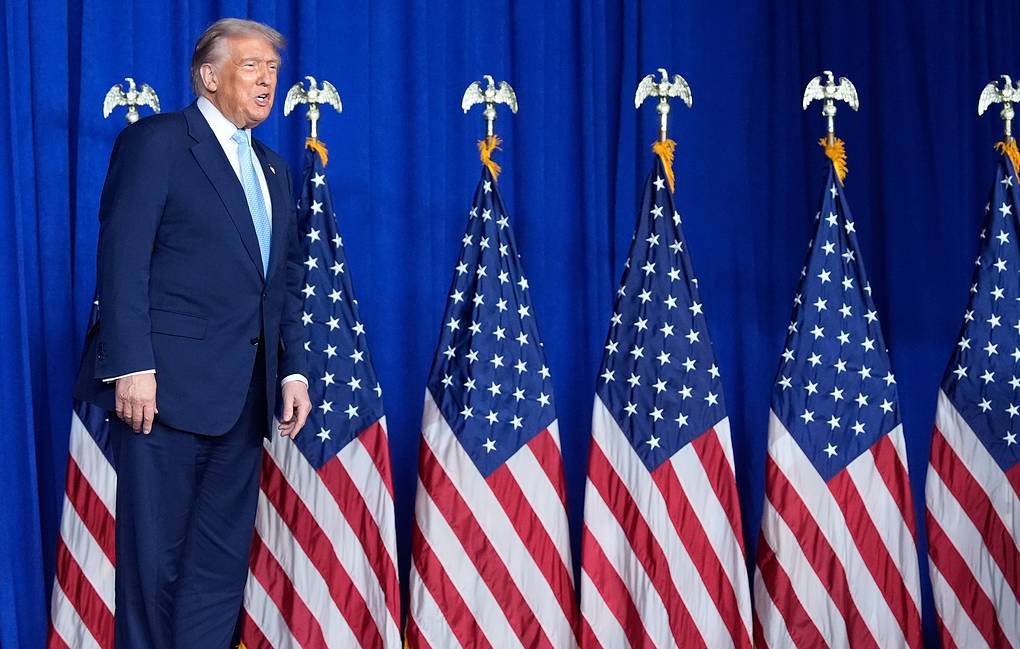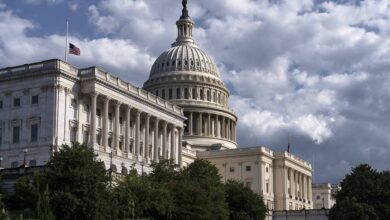Press review: France to send 100 Rafale jets to Kiev as US threatens Russia with sanctions
Top stories from the Russian press on Tuesday, November 18th US President Donald Trump
US President Donald Trump
MOSCOW, November 18. /TASS/. France plans to provide 100 Rafale fighter jets to Ukraine; the US repeats threats to impose secondary sanctions on Russia’s partners; and tensions between Colombia and the US create new opportunities for Russia. These stories topped Tuesday’s newspaper headlines across Russia.
Media: France plans to provide 100 Rafale fighter jets to Ukraine
Vladimir Zelensky and French President Emmanuel Macron signed a memorandum of understanding on weapons supplies to the Ukrainian armed forces. Under the document, Kiev will acquire 100 French-made Rafale fighter jets. The French presidential office said the aircraft delivery would be carried out over the next ten years, Vedomosti reports.
Zelensky stressed that apart from Rafale warplanes, Kiev would also purchase eight SAMP/T air defense systems and radars from France. According to Macron, the deal is expected to be financed through the European Union’s programs, and, possibly, also through the use of Russia’s frozen assets, on which EU countries remain divided.
Eight SAMP/T systems and 100 Rafale fighters will cost about 30 billion euros, the kind of money that neither Ukraine nor France has (should Paris choose to pay for the supplies), Center for Analysis of Strategies and Technologies Director Ruslan Pukhov said. Even if the EU seizes 140 billion euros worth of Russian assets, it will unlikely pay for the deal because the money will be required for more urgent Ukrainian needs, the expert noted.
By agreeing to provide Rafale aircraft to Ukraine, Macron showed political support to Zelensky, Ivan Skorikov, head of the Ukraine Department at the Institute of CIS Studies, observed. On the one hand, the scale of the assistance should not be underestimated, but on the other, it won’t lead to radical changes on the battlefield. Zelensky will take advantage of the plans to purchase Rafale jets to convince the Ukrainian people that the West still stands by Kiev, Skorikov emphasized.
Military expert Anatoly Matviychuk told Rossiyskaya Gazeta that in order to turn the situation in the sky in Ukraine’s favor, Zelensky would need at least 200 such planes. However, France doesn’t have that many of them. "These fighter jets are pretty old, and many have already been retired. Even if France hands them over to Ukraine, the only goal will be to escape the need to dispose of them because it’s a costly process," he pointed out.
The expert believes that Rafale aircraft don’t hold a candle to advanced Russian fighter jets, which will shoot the French planes down long before they approach Russia’s air defenses, and even if they manage to get through, air defense systems will surely destroy them. "This is just an act of propaganda by Macron, which will not have any impact whatsoever on the course of the conflict," Matviychuk concluded.
Media: US threatens Russia with secondary sanctions on partner countries
US President Donald Trump has voiced support for a bill prepared by a group of Congress members, which provides for up to 500% secondary sanctions on the countries that purchase Russian oil, gas, and uranium. First of all, the tariffs may affect China and India. However, Russia’s partners that have already worked out ways to circumvent sanctions are unlikely to abandon trade with Moscow, said experts interviewed by Izvestia.
Trump’s willing to sign sanctions bill against Russia under certain conditions — Reuters
The bill in question was prepared in the spring with the active participation of Republican Senator of South Carolina Lindsey Graham, a Trump ally. Trump has now brought it up in order to put pressure on Russia, Bogdan Bezpalko, a member of the Russian Presidential Council for Interethnic Relations, pointed out. Meanwhile, the bill may negatively affect both the US economy and the US president’s image. "First, it will only increase distrust of the US government, Trump’s policies, and Trump personally. Second, it will also speed up the process of dividing the world into spheres of influence, because those who don’t obey Trump, won't do it now. While those who obey him have long joined the US policy of sanctions on Russia," the expert elaborated.
The US has repeatedly threatened to tighten measures against Russia’s partners. However, many countries turn out to be unwilling to reconsider their trade ties under pressure, refusing to follow someone else’s foreign policy course that runs counter to their economic interests, said Artur Leyer, deputy president of the Association of Exporters and Importers and managing partner at the Lex Alliance law firm.
Freedom Finance Global analyst Vladimir Chernov also believes that even if the US bill is passed, China and India will maintain Russian imports, although they could reduce official volumes and partially move to "gray schemes" and mediators’ services.
Threats involving sanctions-related bills are an element of pressure marking an attempt to strengthen negotiating positions, Vladimir Pavlov, researcher at the Institute for International Studies at Moscow State Institute of International Relations, told Vedomosti. However, the expert does not rule out that the Trump administration will continue to delay the adoption of such documents so as not to hamper the negotiation process.
Izvestia: Russia could make the most of Colombia’s tensions with US
Tensions between Colombia and the United States are growing because of Washington’s activities in Latin America. Bogota has recalled its ambassador for consultations, suspended intelligence sharing with the US, and even threatened to abandon its status of global NATO partner in the region. These developments are opening up new opportunities for Russia’s cooperation with Colombia, Izvestia writes.
Colombia, NATO’s only global partner in Latin America and, until recently, a close US ally in the region, has now found itself among the countries that Washington sees as unfriendly, albeit not officially. CNN has included the country on the list of US adversaries in Latin America, along with Cuba, Nicaragua and Venezuela.
The current situation may prompt Colombia to boost cooperation with other countries, including Russia, experts say. President Gustavo Petro has already announced plans to purchase aviation equipment from Russia, noted Andrey Pyatakov, a leading researcher at the Institute of Latin American Studies. Moscow, for its part, is also open to strengthening ties with the Latin American nation.
Strained relations between Latin American countries and the United States could have a positive impact on their ties with other major trading and political partners, experts believe. However, these countries remain strongly tied to the US economy due to their geographical position. Still, China is expected to benefit the most from the situation. Beijing has long been active on the Latin American market, becoming an important trading partner for many countries. India is also increasing its presence in the region, although not as fast as China.
Russia is determined to develop full-fledged friendly relations with Colombia regardless of the international political situation and the country’s relations with Washington, the press service of the Russian embassy in Bogota told the newspaper. According to the diplomats, Moscow is open to potential initiatives by its Colombian partners. "Notably, Bogota will enter the UN Security Council as a non-permanent member for two years on January 1, 2026. We intend to build constructive cooperation within the UN body on a wide range of issues on the regional and global agenda," the Russian embassy added.
Nezavisimaya Gazeta: Epstein files scandal may result in US president’s resignation
US President Donald Trump has taken a sharp U-turn on the case of Jeffrey Epstein, a billionaire who was convicted of child sexual offences and committed suicide in 2019 but did not reveal the names of his clients. Until recently, the US leader strongly opposed the release of the investigation files but now he has called for making them public. Meanwhile, it seems that Trump had no other choice. For the first time in office, he has faced opposition from a significant portion of his own Republican Party. This is a very bad sign for the president, Nezavisimaya Gazeta notes.
Trump had been promising to release the Epstein files for the entire duration of his election campaign. However, he did not keep his promise after coming to power. Congressional Democrats claim to have received a number of letters from Epstein’s heirs, which he wrote in 2011-2019. The documents mention Trump, even though there is no direct evidence that he was an Epstein client.
The scandal we are witnessing may well be compared to the Watergate case that led to the resignation of US President Richard Nixon, said Vladimir Vasilyev, senior research fellow at the Russian Academy of Sciences’ Institute for US and Canadian Studies. "Democrats are ready to take advantage of the Epstein case in order to make Trump's approval rating plummet, and revise the outcome of the 2024 presidential election," he noted.
Vasilyev believes that the president currently has two options for defense. First, he could shift the blame to Democrats. This is why Trump has asked Attorney General Pam Bondi to investigate Epstein’s suspected links to Democratic Party members, including ex-President Bill Clinton. In Vasilyev’s view, the use of such tactics is unreliable. "A more effective tactic would be to convince Democrats of his readiness to make concessions on other issues, including foreign policy," the expert specified.
This recalls Trump’s first presidential term, when accusations of his ties to Russia made him take rather tough action against Moscow. The same will probably happen now, Vasilyev said.
Izvestia: UK plans to abandon Russian uranium imports by 2028
The United Kingdom will abandon Russian uranium purchases by 2028, replacing them with US supplies. London also has ambitious plans to reduce Russia’s share on the global nuclear fuel market, and is constructing a uranium enrichment facility. Experts interviewed by Izvestia doubt the UK will be able to remove Russia from the market.
Britain currently has nine nuclear reactors at four power plants, which generate 15% of the country’s electricity. However, nuclear energy’s share in the nation’s overall energy balance has significantly dropped since the 1990s, and many reactors are outdated. The only major nuclear power plant under construction is Hinkley Point C, but the project has been hit by delays. In January 2024, the British cabinet announced a roadmap for the development of the civilian nuclear energy sector through 2050, aimed at revitalizing the nuclear energy industry and raising its share in the energy balance to 25%.
London is actively investing in the production of high-grade low-enriched uranium, expanding the output of fuel for advanced small modular reactors, said Oleg Okhoshin, senior researcher with the Center for British Studies at the Russian Academy of Sciences’ Institute of Europe. A plant for the production of high-enriched uranium is expected to be launched in the northeastern county of Cheshire by 2031; $250 million has been allocated for its construction.
The United Kingdom lags quite far behind in the nuclear energy sector due to a shift of focus to renewable energy sources. That said, it will take London several years to launch enriched uranium production. Russia’s losses won’t be high because most of the country’s enriched uranium is exported to other countries, Stanislav Mitrakhovich, an expert at the National Energy Security Fund and the Financial University under the Russian Government, pointed out. Okhoshin agrees that the UK stands no chance of removing Russia from the nuclear energy market.
Igor Yushkov, another expert at the Financial University under the Government of the Russian Federation and the National Energy Security Fund, believes that a ban on the import of Russian enriched uranium to the US, the EU and the UK will reshape the market. Moscow will redirect its exports to Asian countries. Compared to oil and gas revenues, the federal budget doesn’t receive much from uranium sales, so these changes won’t have a significant impact on the Russian economy.

